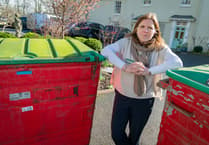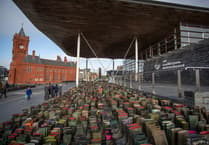SHOCKING new figures show that the Wye Valley produces the highest amount of animal poo in the UK thanks to large-scale industrial farming.
Untreated chicken manure spread on over-saturated fields which is washed into the river has been blamed by environmental campaigners for catastrophic damage to the Wye’s eco-system.
Now new figures compiled by environmental and sustainable farming group Sustain have confirmed that the Wye Valley is top of the muck pile, producing 2.5k tonnes every day.
And with the equivalent of more than 100 double decker buses of untreated animal poo produced nationwide every hour, they are calling on local authorities to use their planning powers to stop the spread of industrial livestock farms.
A spokesperson said: “Every hour, industrially reared chickens, pigs and dairy cows generate the equivalent of well over 100 double decker buses of toxic poo, or 50,000 tonnes a day.
“This waste contains a toxic cocktail of pollutants, including nitrates, phosphates, and antibiotic resistant bacteria.
“The volume is more than can be absorbed by the soil so it spills into rivers, causing algal blooms that choke wildlife. Every region in the UK is now in ‘nitrogen surplus’
“More than 40% of total nitrogen pollution comes from livestock manure and regions of England with high concentrations of industrialised indoor-reared livestock have the biggest nitrogen surplus.
“For example, industrial farms along the Wye Valley alone produce 2,500 tonnes of manure every day.
“This toxic animal waste in turn produces 13,038 tonnes of nitrogen and 4,443 tonnes of phosphates every day.
in many places, industrial livestock units are still receiving planning approval and being built.
“Sustain is calling on councils to introduce local planning regulations to require all livestock developments to prove that they are contributing to reversing, rather than exacerbating, pollution and biodiversity decline, and to tackle the climate emergency.
“The campaign is also demanding that national government reforms planning policy to put climate change, nature and biodiversity decline at the heart of considerations for all applications.
“This would mean the most polluting industries would be required to disclose the harm they cause at planning stage, and be rejected where there is clear evidence of damage.”
Ruth Westcott, Sustain’s Climate and Nature Emergency coordinator, said:
“Our rivers are on the brink of ecological collapse.
“People are waking up to the fact that rivers are the life blood of our country, and a cornerstone of our economy, but we can’t forget that the big industrial livestock farms are a big factor in this disaster.
“Local councils have power. They can show they are serious about cleaning up our rivers by adopting planning policy to support nature-friendly farming rather than more intensive livestock units.”
Dr Nick Palmer, Head of Compassion in World Farming UK, said: “The new analysis by Sustain highlights the alarming impact of excreta from industrial farms across the UK.
“On many of these farms, animals are also caged and confined in ways that inflict appalling suffering.
“We need a ‘less and better’ approach which protects the environment and animal welfare.
“Local authorities can change the future for our society by drawing up planning guidance to encourage a more sustainable, agro-ecological approach without factory farming.”




